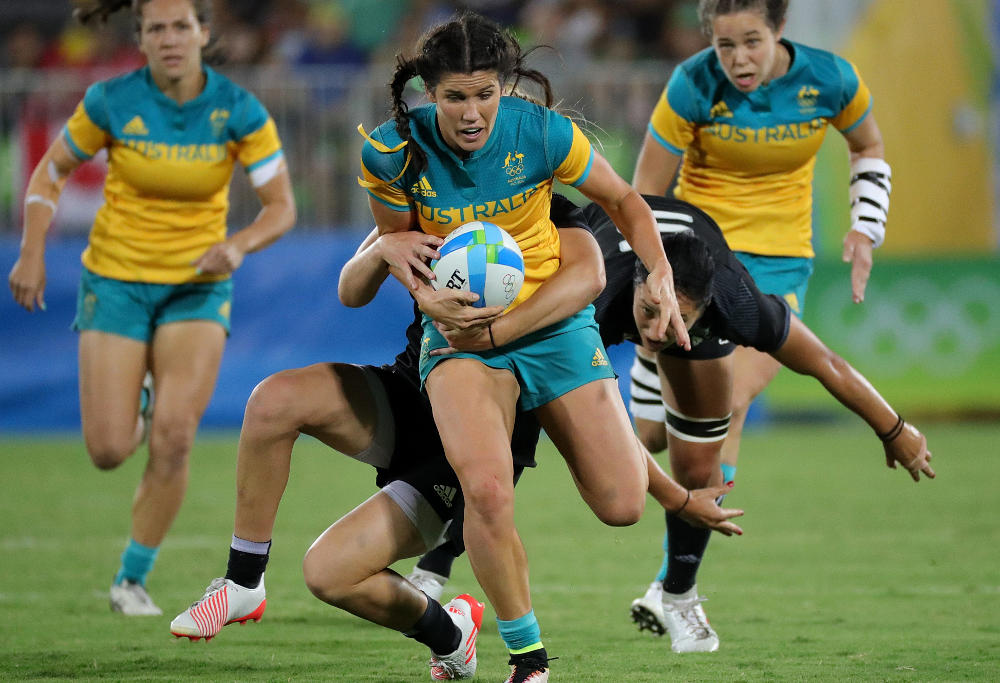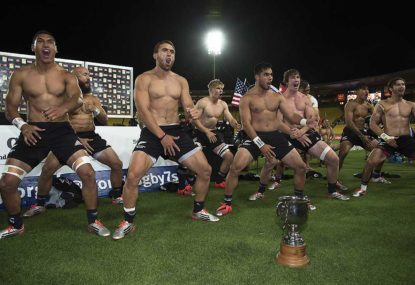In the next couple of weeks, World Rugby’s Sevens series will enjoy and be confronted, with two contrasting tournaments in terms of public endorsement.
The Sydney Sevens, according to statements issued by the ARU, will be close to a sell-out.
With the experience of cricket’s Big Bash League to guide the organisers, the event is certain to be the family-oriented spectacle that will create a memorable event.
More importantly, the groundwork for the tournament to flourish for many decades to come will be laid during this tournament.
Unfortunatley, expectations for this weekend’s Wellington Sevens are dramatically different, with organisers hoping for 15,000 fans each day at the ‘Cake Tin’ stadium on the waterfront.
There is the dire concession that if the weather is not sunny – and remember, Wellington is the Windy City – then the crowd numbers might fall short of expectations.
It’s a far cry from the glory days, when all 34,500 seats for both days were sold out virtually as soon as they were listed.
So why have the Wellington public turned their back on the tournament?
There is the argument that sevens rugby is no longer ‘cool’, but statistics from World Rugby indicate that the series is growing rapidly in crowd and television viewing numbers. The success of the concept at the Rio Olympics has intensified public interest around the world.
The Guardian‘s Robert Kitson recently discussed this issue, among others, related to sevens rugby, in an article headed ‘Growing popularity of sevens demands it be given the respect it deserves’:
Online research conducted last year by Nielsen Sports in the key markets of Australia, France, Germany, Japan, the United Kingdom and the United States suggested nearly 17 million new fans worldwide, particularly among women and the 18-24 age group, were attracted by what they saw at the Games. Within five years China hope to have a million rugby players enjoying a sport which, in Mandarin, apparently translates as ‘English-style olive ball’. Australia’s exciting gold medal-winning women’s sevens team are even gracing the pages of this month’s Australian Vogue.
The Sydney Sevens is clearly being given a rocket boost from the success at Rio of the Pearls, Australia’s women’s sevens team, a side that is chock-full of charismatic players who are winners on and off the field.

The mystery is why the enthusiasm for the Sydney tournament, in a rugby league city, is not being matched for the Wellington Rugby Sevens, in a rugby-mad city.
Enter former Test cricketer and leading administrator Martin Snedden, the organiser of the successful 2011 Rugby World Cup.
“History will judge the Wellington Sevens down the track as being an amazing success story, but what’s really apparent now is that it’s probably run its course,” Snedden told Stuff.
“That’s not a negative comment. That’s really a reflection of the fact that an event has a life cycle … and this one seems to have reached the end.”
This weekend will be the 18th installment of the Wellington Sevens, meaning the notion that this is about the life-cycle limit of this type of tournament is rather pessimistic.
The Hong Kong Sevens tournament stretches back, after all, to the glory days of Mark Ella and David Campese. Their talents, in fact, created a number of tournament wins to Australian teams which, in turn, led to the Hong Kong tradition of the crowd invariably booing the Aussie team, and Australian lawyers and doctors booking into conferences held during the tournament.
During the glory days of the Wellington Sevens, 2004 in fact, I along with my wife Judy had the pleasure of being in the VIP area for the entire tournament. We spent hours chatting to the US Ambassador and his wife, enlightening them – or trying to enlighten them – on the various mysteries of the rugby laws.
The good spirits of the crowd were a pleasure to behold. A topless woman was protected by the crowd, for instance – when the police came to arrest her, they were directed to another section of the ground.
The stars of the tournament were the Kenyans. Judy saw them warming up for their match against Korea, near the dead-ball area, which our box overlooked.
“The Kenyans will win easily,” she told the Ambassador and myself.
I told her that the Kenyans were playing in their first Wellington tournament and had no form, whereas the Koreans had played competently at a number of sevens tournaments.
“The Kenyans,” the indomitable Judy reasoned, “have much nicer legs than the Koreans and more attractive butts. They are bound to win.”
And win they did, then went on to defeat the Australians.
The crowd was ecstatic, not only because of the victory over the hapless Australians, but because the way the Kenyans played – their free-spirited running, their manly tackling, and the white-teethed grinning pleasure they took from the game – was so infectious.
Some time after this, the crowds attending it and the organisers lost the plot of what the tournament really had to be about.
The organisers plucked the golden goose and started charging extremely high ticket and food prices.
The party reputation that was created by the dozens of Elvis lookalikes, the nurses and all the other garbs, gave way to a boozathon mentality. Hundreds of people were charged for drunkenness. Lady Patrick Campbell’s admonition that people can do anything “so long as they don’t do it in the streets and frighten the horses” was ignored, as being drunk and disorderly became the epitome of having a good time.
In 2014 about 270 drunken spectators were kicked out of Westpac Stadium.
Dr John Guthrie, a sports marketing expert, told Stuff that the Wellington sevens had become a boozy “mates day out”, and the organisers’ attempts to restore the “family-friendly” atmosphere would not appeal to the 20 to 30-year-olds (the new sevens addicts, according to Kitson).
An editorial in Wellington’s daily newspaper, The Dominion, is cautiously optimistic that the “Wellington tradition” will somehow survive.
… two things are clear. The first is that, whatever some people might want, the event can’t be as loose as it once was.
The second is that it’s worth persevering with, at least for a while longer. The organisers have made plenty of changes in recent years, like cutting prices and increasing the entertainment offerings. They might have laid the groundwork for a renewed event. Abandoning it before we find out would be a shame.
Time will tell, presumably.
On Tuesday, the ARU issued a media release announcing two debutants for Wellington in the men’s sevens squad. The new faces are Queenslander Tate McDermott and Sydneysider Dylan Pietsch, who seems a likely star of the future (and featured here on The Roar late last year).
According to coach Andy Friend, “Dylan’s quite a big bloke for an 18-year-old, he’s got a good step on him and a good carry of the football. Momentum is his friend, he’s a powerful boy.”
No mention of “nice legs” or an “attractive butt”, but still one to watch over the weekend, I reckon.






























































































